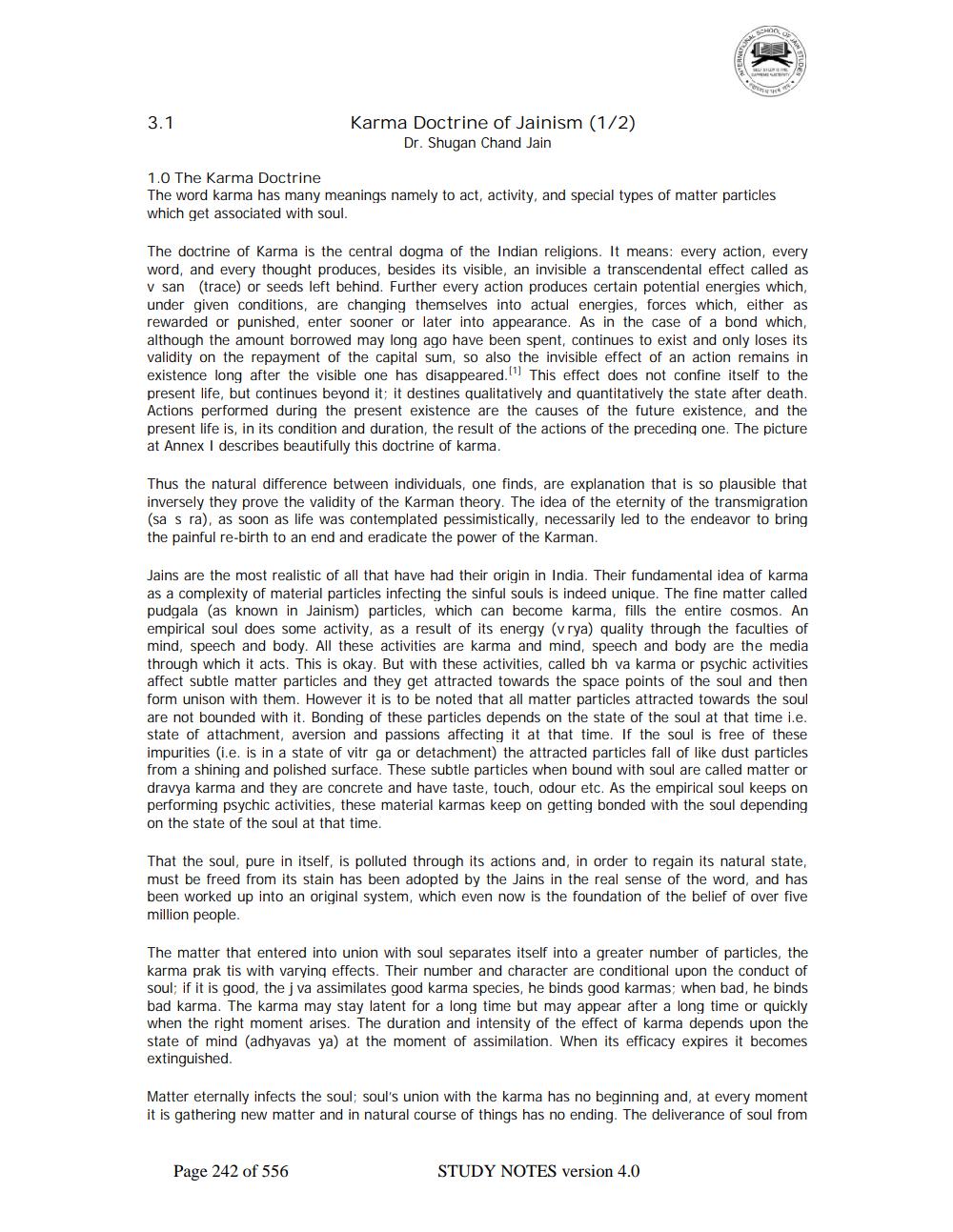________________
3.1
Karma Doctrine of Jainism (1/2)
Dr. Shugan Chand Jain
1.0 The Karma Doctrine The word karma has many meanings namely to act, activity, and special types of matter particles which get associated with soul.
The doctrine of Karma is the central dogma of the Indian religions. It means: every action, every word, and every thought produces, besides its visible, an invisible a transcendental effect called as v san (trace) or seeds left behind. Further every action produces certain potential energies which, under given conditions, are changing themselves into actual energies, forces which, either as rewarded or punished, enter sooner or later into appearance. As in the case of a bond which, although the amount borrowed may long ago have been spent, continues to exist and only loses its validity on the repayment of the capital sum, so also the invisible effect of an action remains in existence long after the visible one has disappeared." This effect does not confine itself to the present life, but continues beyond it; it destines qualitatively and quantitatively the state after death. Actions performed during the present existence are the causes of the future existence, and the present life is, in its condition and duration, the result of the actions of the preceding one. The picture at Annex I describes beautifully this doctrine of karma.
Thus the natural difference between individuals, one finds, are explanation that is so plausible that inversely they prove the validity of the Karman theory. The idea of the eternity of the transmigration (sa s ra), as soon as life was contemplated pessimistically, necessarily led to the endeavor to bring the painful re-birth to an end and eradicate the power of the Karman.
Jains are the most realistic of all that have had their origin in India. Their fundamental idea of karma as a complexity of material particles infecting the sinful souls is indeed unique. The fine matter called pudgala (as known in Jainism) particles, which can become karma, fills the entire cosmos. An empirical soul does some activity, as a result of its energy (vrya) quality through the faculties of mind, speech and body. All these activities are karma and mind, speech and body are the media through which it acts. This is okay. But with these activities, called bh va karma or psychic activities affect subtle matter particles and they get attracted towards the space points of the soul and then form unison with them. However it is to be noted that all matter particles attracted towards the soul are not bounded with it. Bonding of these particles depends on the state of the soul at that time i.e. state of attachment, aversion and passions affecting it at that time. If the soul is free of these impurities (i.e. is in a state of vitr ga or detachment) the attracted particles fall of like dust particles from a shining and polished surface. These subtle particles when bound with soul are called matter or dravya karma and they are concrete and have taste, touch, odour etc. As the empirical soul keeps on performing psychic activities, these material karmas keep on getting bonded with the soul depending on the state of the soul at that time.
That the soul, pure in itself, is polluted through its actions and, in order to regain its natural state, must be freed from its stain has been adopted by the Jains in the real sense of the word, and has been worked up into an original system, which even now is the foundation of the belief of over five million people.
The matter that entered into union with soul separates itself into a greater number of particles, the karma praktis with varying effects. Their number and character are conditional upon the conduct of soul; if it is good, the j va assimilates good karma species, he binds good karmas; when bad, he binds bad karma. The karma may stay latent for a long time but may appear after a long time or quickly when the right moment arises. The duration and intensity of the effect of karma depends upon the state of mind (adhyavas ya) at the moment of assimilation. When its efficacy expires it becomes extinguished.
Matter eternally infects the soul; soul's union with the karma has no beginning and, at every moment it is gathering new matter and in natural course of things has no ending. The deliverance of soul from
Page 242 of 556
STUDY NOTES version 4.0




